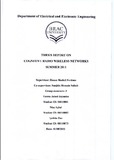Cognitive radio wireless networks
Abstract
Standards groups and regulatory bodies around the world are increasingly seeking new ways of using, allowing access to, or allocating spectrum. In most parts of the world, cellular network bands are overloaded, but amateur radio and paging frequencies are not. Independent studies performed in some countries confirmed that observation, and concluded that spectrum utilization depends strongly on time and place. Moreover, fixed spectrum allocation prevents rarely used frequencies (those assigned to specific services) from being used by unlicensed users, even when their transmissions would not interfere at all with the assigned service. This was the reason for allowing unlicensed users to utilize licensed bands whenever it would not cause any interference (by avoiding them whenever legitimate user presence is sensed). This paradigm for wireless communication is known as cognitive radio.

